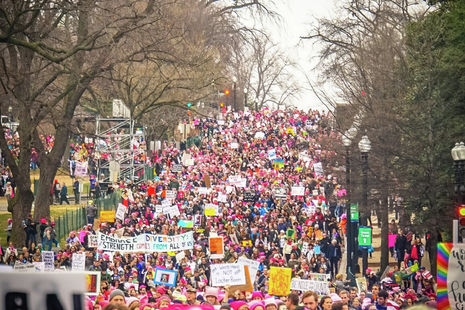Growing up with Trump: how can Gen-Z reclaim politics?
With populism ascending alongside youth political disillusionment, we need more than just formal youth parliament spaces for Gen-Z engagement, argues Daisy Stewart Henderson

Earlier this month, I woke up and felt like I was eleven again. Admittedly, instead of my Mum, it was the dulcet tones of my alarm clock that awoke me at a much later hour than she would have allowed back in 2016. The brightly-coloured mind map on my desk had been traded for a furiously-annotated copy of Leviathan, and my room at university had a marked absence of pineapple bunting and stuffed toys that my younger self may well have baulked at. Yet the rush of despair was identical. Because for the second time in my life, Donald Trump had won a presidential election.
“The polarisation and populism that shot to dominance within Western politics during the 2010s appears to have found a foothold among my generation”
The polarisation and populism that shot to dominance within Western politics during the 2010s appears to have found a foothold among my generation. It’s endemic on social media, where children can access vitriolic right wing hate and rabid conspiracies with as much ease as their homework. Nor is the left wholly innocent. I genuinely believe that the garish Instagram infographics that flooded my fifteen-year-old self’s phone screen during the disorienting upheavals of 2020 have a great deal to answer for. They reduced the level of nuance afforded to issues to a quantity that can be conveyed on a pretty Canva graphic. Some of these effects are yet to become apparent, and they only will as the political leaders of tomorrow who came of age in the crucible of Covid take office. Likely, they will tackle the defining issues of their day with the sophistication and sensitivity of a frustrated teenager on TikTok.
Yet can we blame the young? After all, it was the grown-ups who set the tone of the brand of politics that we have inherited. A slew of bad role models dominated politics during our most formative years. It’s unsurprising that for some, debate has come to be synonymous with shouting matches or Twitter feuds. All too often, the choice appears to be taking on these roles, or surrendering your voice all together.
I, for one, spent a lot of my teens feeling politically disillusioned. Sometimes I still do. But I am exceptionally lucky. I spent two years as a Member of the Scottish Youth Parliament, where I was given the opportunity to speak to politicians and civil servants in the upper echelons of governance. I met the King, and even travelled to Geneva not once but twice, with all expenses covered, to give an account of the issues facing British children to the UN Committee on the Rights of the Child.
But although Britain’s youth parliaments provide an invaluable forum for political expression, they are not without their flaws. Despite their official positions of non-partisanship, accusations that some forms of party partiality are more accepted than others within youth parliaments is more than just baseless Daily Mail grumbling about ‘wokeness’. In the Scottish Youth Parliament, the democratic process was that if a piece of policy was passed by the majority of the membership, we were not permitted to speak against it. Resultantly, only one position was allowed on some of the most polarising debates at the time. In some instances, the bounds of impartiality were stretched into the realm of absurdism. For example, I, as the newly-elected sixteen-year-old convener of the international relations committee, was told in no uncertain terms by a staff member that expressing condemnation for Putin’s invasion of Ukraine was unacceptable. It would violate the non-partisanship rule, and besides, a focus on Ukraine would be offensively Eurocentric. This was approximately a month after tanks rolled onto Ukrainian soil.
I am highly grateful for the opportunities I was afforded as a youth parliamentarian, and see particular value in the approach to politics they advocated, in which human rights as opposed to partisanship were paramount. But even these most official channels of youth political participation are far from immune from the plague of polarised and nuanceless debate. And at times it felt like my successes stemmed from an adeptness at toeing the line.
“In reality, Gen-Z have every reason to be disillusioned. Yet we cannot allow ourselves to be”
Perhaps this is a moot point. Because ultimately, how can organisations championing youth political engagement compete with the reach of the internet and its visceral power? In reality, Gen-Z have every reason to be disillusioned. Yet we cannot allow ourselves to be. To reduce politics to a handful of spiteful characters is an injustice to ourselves, and to the generations that will follow us.
One of the most important lessons I have learned at Cambridge so far is the value of scrutiny, particularly of oneself. If I could, I might tell my eleven-year-old self this. I doubt she’d be particularly pleased by my prophecy of November 2024, but equally, I don’t think she would have much time for wallowing in disillusionment. If there is one thing for Gen-Z to be petulant and strident about, it’s this.
 News / Colleges charge different rents for the same Castle Street accommodation2 March 2026
News / Colleges charge different rents for the same Castle Street accommodation2 March 2026 News / King’s hosts open iftar for Ramadan3 March 2026
News / King’s hosts open iftar for Ramadan3 March 2026 Theatre / Lunatics and leisure centres 4 March 2026
Theatre / Lunatics and leisure centres 4 March 2026 News / Angela Merkel among Cambridge honorary degree nominees27 February 2026
News / Angela Merkel among Cambridge honorary degree nominees27 February 2026 News / News in Brief: waterworks, wine woes, and workplace wins 1 March 2026
News / News in Brief: waterworks, wine woes, and workplace wins 1 March 2026









